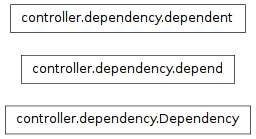
Inheritance diagram for IPython.parallel.controller.dependency:

Dependency utilities
Authors:
Bases: set
An object for representing a set of msg_id dependencies.
Subclassed from set().
| Parameters : | dependencies: list/set of msg_ids or AsyncResult objects or output of Dependency.as_dict() :
all : bool [default True]
success : bool [default True]
failure : bool [default False]
If `all=success=True` and `failure=False`, then the task will fail with an ImpossibleDependency :
|
|---|
Add an element to a set.
This has no effect if the element is already present.
Represent this dependency as a dict. For json compatibility.
check whether our dependencies have been met.
Remove all elements from this set.
Return a shallow copy of a set.
Return the difference of two or more sets as a new set.
(i.e. all elements that are in this set but not the others.)
Remove all elements of another set from this set.
Remove an element from a set if it is a member.
If the element is not a member, do nothing.
Return the intersection of two or more sets as a new set.
(i.e. elements that are common to all of the sets.)
Update a set with the intersection of itself and another.
Return True if two sets have a null intersection.
Report whether another set contains this set.
Report whether this set contains another set.
Remove and return an arbitrary set element. Raises KeyError if the set is empty.
Remove an element from a set; it must be a member.
If the element is not a member, raise a KeyError.
Return the symmetric difference of two sets as a new set.
(i.e. all elements that are in exactly one of the sets.)
Update a set with the symmetric difference of itself and another.
Return the union of sets as a new set.
(i.e. all elements that are in either set.)
return whether this dependency has become impossible.
Update a set with the union of itself and others.
Bases: object
Dependency decorator, for use with tasks.
@depend lets you define a function for engine dependencies just like you use apply for tasks.
Examples
@depend(df, a,b, c=5)
def f(m,n,p)
view.apply(f, 1,2,3)
will call df(a,b,c=5) on the engine, and if it returns False or raises an UnmetDependency error, then the task will not be run and another engine will be tried.